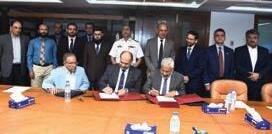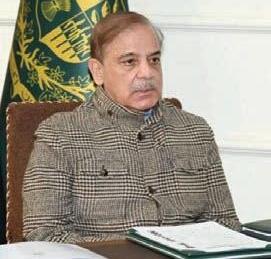LEADERS’ EXODUS FROM PTI CONTINUES AS SHIREEN MAZARI, CHOHAN ALSO JUMP SHIP
g SO
Govt set to present budget FY24 in NA on June 9
FAR
24 PTI LEADERS HAVE PUBLICLY PARTED WAYS WITH THE PARTY
ISLAMABAD STAFF REPORT
THEPakistan Tehreek-e-Insaf continued to suffer blow from ‘defection’ as two more senior leaders – former Federal Minister for Human Rights Shireen Mazari, and Fayyazul Hasan Chohan announced quitting the party.
So far, 24 PTI leaders have now publicly parted ways with the party, a situation some political analysts are attributing to pressure from ‘external forces’, after the tragic incidents of May 9.
Speaking at a press conference, Mazari said that she will not be involved in politics in the future, while Chohan said he would continue his political struggle, but without PTI.

Joining Mazari and Chohan in parting ways with PTI is Abdul Razaq Khan Niazi, a former PTI Member of Provincial Assembly (MPA) from Khanewal.
In a press conference, Niazi condemned the attacks on military installations and suggested that such actions could not have occurred without the support of the party leadership. He further claimed that the events of May 9 had brought joy to India, insinuating a connection between the PTI’s actions and India’s interests.
Additionally, PTI leader Khawaja Qutab Fareed Koreja from Liaqatpur has decided to join the Pakistan Peoples Party (PPP) after observing the growing strength of the party in south Punjab and the shifting political landscape.
On the other hand, in a cryptic reference to “forced divorces”, Pakistan Tehreek-e-Insaf (PTI) Chairman Imran Khan on Tuesday responded to the ongoing exodus of leaders from the party, with the total now reaching 24 since the violent arson incidents of May 9.
“We had all heard about forced marriages in Pakistan, but for PTI, a new phenomenon has emerged: forced divorces. Also wondering where have all the human rights organizations in the country disappeared,” the former prime minister said in a tweet from his official account.
In his response, Imran raised questions about the situation’s implications for human rights within the country, subtly questioning the sudden absence of human rights organszations during these developments.
The wave of resignations marks a significant period of turmoil for PTI, which was toppled from government on April 9 last year when Imran Khan was ousted from the office of premier through a vote of no-confidence.
The attacks on military monuments and buildings have prompted several PTI members to abandon the party and condemn the incidents. Some political analysts speculate that the exodus is a result of pressure from ‘external forces’. PTI Chairman Imran Khan has repeatedly claimed that party members face immense pressure to abandon the PTI.
Prominent figures who have recently left the party include former federal health minister and founding member of PTI Aamer Mahmood Kiani, Chaudhry Wajahat Hus-
g ‘FORCED DIVORCES’: IMRAN REACTS TO LEADERS’ EXODUS FROM PTI
Prime Minister Shehbaz Sharif on Tuesday was briefed about preparation of the budget for the upcoming financial year 2023-24 (FY24), which will be presented on June 9 in the National Assembly after approval by the federal cabinet.
The PM was briefed about revised estimates of revenue and expenditures and target estimates for the next year. “The economy has been on a positive trajectory toward financial stability and a decrease in deficit,” the meeting was informed.
PM Shehbaz said that all available resources should be used to reduce the financial difficulties and provide relief to the middle class. He expressed satisfaction that prices of urea are continuously decreasing as a result of timely and prudent strategy of the government.
He said that during the past two months, a current account surplus has been achieved after many years and the economy of the country is heading towards positive trajectory. He directed to take concrete steps to increase revenue and enhance tax net.
sain (brother of Pakistan Muslim League-Quaid (PMLQ) chief Chaudhry Shujaat Hussain), former federal minister Malik Amin Aslam, former provincial minister Dr Hisham Inamullah Malik, PTI West Punjab President Faizullah Kamoka, and Dr Muhammad Amjad.
Departures have also been witnessed in Sindh, where Mehmood Moulvi (PTI Sindh Vice President), Aftab Saddiqui (PTI Karachi President), Syed Zulfiqar
Ali Shah, Jay Parkash, Sanjay Gangwani, and Dr Imran Shah have left the party. In Khyber-Pakhtunkhwa (K-P), Ajmal Wazir (former spokesperson for the K-P Chief Minister and adviser on information), Usman Tarakai, and Malik Jawad Hussain have departed from the PTI. Meanwhile, former provincial minister Mubeen Khilji has quit the party in Balochistan.
Qureshi, Musarrat Cheema, spouse re-arrested after release from Adiala Jail
RAWALPINDI: Pakistan Tehreek-e-Insaf (PTI) senior leaders – Shah Mahmood Qureshi, Jamshed Iqbal Cheema and his wife Musarat Jamshed Cheema were rearrested moments after they were released from Adiala Jail on Tuesday evening. As per details, PTI Shah Mahmood was released from Adiala jail but he was taken into custody right after his release. Similarly, PTI claimed that party leader Musarrat Cheema was rearrested upon her release, terming it an example of the government’s “fascism”.
“These practices must be stopped immediately, court’s decisions must be respected now,” the party said. On the other hand, Party leader Jamshed Cheema re-arrested upon release The PTI said party leader Jamshed Cheema has been re-arrested outside Adiala Jail upon his release. The party’s statement said Cheema was re-arrested by Punjab police.
Earlier in the day, Islamabad High Court issued an order for the release of Shah Mahmood Qureshi.
Upon reviewing the sworn statement submitted by Qureshi’s lawyers, the honourable judges reached a decision and order for release of Shah Mahmood Qureshi.
It is pertinent to mention here that PTI vice chairman Shah Mehmood Qureshi was taken into custody by police
Anatomy of a budget
SHAHNAWAZ ALI
Year in year out, Pakistanis talk about the economic problems that are faced by the country. The bulletin is mostly rife with news of default and falling reserves. Not only is it a major driver of the political discourse in the country it is sometimes the entire reason, on which political upheavals are based.
In working democracies, political discourses determine public demand, and public demand brings about legislative measures. Contrarily, Pakistan follows a top down approach, wherein, a party’s political will determines legislative measures and that in turn translates into narrative that’s digested verbatim by the party’s supporters and rejected unanimously by the opposers.
And central to a country’s economic policy is the annual budget. It is in this document that a government decides whether it will increase or decrease its expenditure in a particular sector. The government also projects the revenues that it will collect through taxes and other sources in the budget and it is based on those estimates that the government allocates budgets to different sectors, ministries and provinces.
In essence making a budget is an accounting exercise, with underlying policy objectives. The accounting exercise is divided into 6 essential steps namely, Preparation, Authorization, Execution, Reporting and Monitoring, Review and Policy setting. This sounds a well-rounded approach to tackle the exercise however
oftentimes, the miscalculation in the first two steps, renders the last 3 utterly moot.
The annual budget statement (ABS) is the main document for the federal budget. After the preparation and authorization, the ABS makes its way to the senate and eventually to the public. In terms of expenditures, the ABS categorically differentiates between “Receipts” and “Expenditures”.
Revenues/Receipts:
Receipts or revenue consists of balances of all budgetary receipts, e.g. Revenue Receipts, Capital Receipts, External Receipts, Public Account Receipts. These resources constitute federal gross receipts. This means that the provincial share is deducted to arrive at net federal receipts available to finance federal expenditures.
It’s important to note that the distribution of revenue between the federal government and the provinces is guided by the principles laid out in the NFC Award. The award determines the share of each province in the federal revenue pool based on factors such as population, backwardness, revenue generation capacity, and other socio-economic indicators.
Additional resources in reciepts may include privatization proceeds plus credit from the banking sector to finance government expenditures.
Expenditures:
The other part of the ABS is expenditures. Expenditure is broken down into current expenditure and development expenditure and is separately shown for expenditure on Revenue Account and expenditure on
in Islamabad. As per details, Shah Mehmood Qureshi was arrested from Gilgit Baltistan House in Islamabad, soon after the riots erupted across Pakistan following the arrest of former prime minister Imran Khan in the Al-Qadir Trust case. Qureshi’s arrest was an addition to the tally as several PTI leaders including former Governor Punjab Omer Sarfraz Cheema, PTI secretary general Asad Umar and PTI Vice President Fawad Chaudhry were already apprehended by police.
Earlier, there were reports that PTI leader Jamshed Cheema had decided to part ways with the party over May 9 violence. According to a video of the counsel for Cheema, he held a meeting with Jamsheed Cheema in jail. “I am confident that he would quit PTI as soon as he comes out of jail,” he said. Cheema’s lawyer further said his client is upset over the attacks on military installations on May 9.
Condemning the re-arrest and “custodial torture” of PTI leaders, workers and supporters, party chief Imran Khan has vowed to “resist till my last breath”.
“The constitution is being brazenly violated along with SC rulings. Police are being used to crush PTI, our leaders forced to quit the party,” he further said in a tweet, adding that “giving into this cruelty means the death of our nation”. STAFF REPORT
The prime minister also directed the authorities concerned to finalise pension reforms at the earliest and establish a pension fund through adopting creative methods to lessen the burden on the national treasury to ensure welfare of the pensioners.
Ambassador Durrani appointed special envoy on Afghanistan
ISLAMABAD MIAN ABRAR
Former Ambassador Asif Ali Durrani on Tuesday was appointed as special representative of Pakistan on Afghanistan. The announcement came after a lapse of around two months when former special envoy on Afghanistan, Mr Mohammad Sadiq, resigned. A notification on the new appointment reads: “The Prime Minister has been pleased to approve the appointment of Ambassador (retd) Asif Ali Khan Durrani as Special Representative on Afghanistan with immediate effect.”
Capital Account. Expenditure on Revenue Account signifies that portion of expenditure which is met from resources such as tax revenue and receipts, whereas expenditure on Capital Account refers to expenditure which is financed from loans, finances, credits, grants, and other borrowings. The biggest current expenditures on the revenue account that Pakistan incurs are General Public Service and Defense affairs and services. The General Public Service mainly inculcates the servicing of domestic and foreign debt. Apart from that it includes administrative and research expenditures of “General Public Service”. Collectively these two expenses were budgeted at 6.7 trillion in the 2023 budget, which is close to 90%.
As per recent estimates, Pakistan is expected to spend more than 90% of its revenue target in debt servicing, leaving very little to no cushion for defense, let alone other expenses. In the past Pakistan has financed the deficits of its budget through borrowing from international and domestic sources. However, it is this very unsustainable nature of budgeting that has led Pakistan to where it is today.
With virtually no opposition in the legislative assembly, the federal government is most likely to pass their version of the budget this time around. A budget that gets implemented without opposition is not entirely representative of the people’s wishes. Specifically a budget as critical as that of 2023. One thing is however, clear as day. In terms of development, quality of life and economic stability, 2023-24 is possibly going to be one of the worst years for the common man.
Ambassador Durrani, a career diplomat, served as deputy chief of Pakistan’s mission in Kabul from 2005 to 2009. He also served as Pakistan’s ambassador to Iran and United Arab Emirates (UAE). Currently, Mr Durrani was serving as Senior Research Fellow in Islamabad Policy Research Institute (IPRI). Mr Durrani comes from a family of seasoned diplomats and bureaucrats from Quetta, Balochistan, and has mastered the skill of resolving issues amicably. However, Mr Durrani has a challenging job at hand as relations between Pakistan and Afghanistan are complex now-a-days and recent incidents and attacks from Tehreek-i-Taliban Pakistan and its splinter groups have added to the misunderstandings between the two neighbours.

Moreover, Mr Durrani’s appointment also comes amid discussions being made to expand the multibillion-dollar project of China-Pakistan Economic Corridor (CPEC) into Afghanistan which can connect the landlocked Central Asia to the rest of the world through Afghanistan and Pakistan.
Afghanistan, which is going to become a pivot country in the trade and connectivity through the Belt and Road Initiative (BRI) launched by China, can benefit hugely if peace and stability can return to the conflicthit nation which is facing war since past 40 years. Though both countries have an opportunity to start afresh following the recent trilateral dialogue as Chinese Foreign Minister Mr Qin Gang and Afghan’s Acting Foreign Minister Mr Amir Khan Muttaqi visited Pakistan. The meeting ended on a positive note and a joint communique was issued which reflected development on major issues including trade and joint action against terrorism.
Mudassir
Aqil leaving Telenor Microfinance
Bank (EasyPaisa), but what is he leaving behind?
g AFTER PUTTING BUSINESS ON A PROFITABLE PATH, AQIL BIDS FAREWELL TO ONE OF LARGEST MICROFINANCE INSTITUTIONS
KARACHI
MARIAM UMAR FAROOQ
More than three years after taking charge as CEO of Easypaisa, M Mudassar Aqil has decided to step down from his position to pursue an opportunity overseas. The departure marks the end of a formative period in the history of the Telenor Microfinance Bank Limited, better known as Easypaisa, in which the company came out of the smoke of fraud allegations and became profitable.
Mudassar joined Telenor Microfinance
Bank Limited (Easypaisa) as CEO in November 2019, replacing Shahid Mustafa. This
was not his first stint in the microfinance sector, previously he was a CEO at FINCA, another microfinance institution in Pakistan.
At the time, a large fraud in the microfinance lending business had just been uncovered, presenting Aqil with a daunting task upon his arrival. “The bank was in a difficult situation when I joined due to the recent discovery of significant fraud in our microfinance lending business. The aftermath of fraud was what I had to deal with after my joining,” says Aqil while reflecting on his first days heading Easypaisa. How did Easypaisa come out of this mess?
When the management of Mudassir Aqil
came in, they identified credit irregularities in the loan portfolio, which included cases of collusion to commit fraud between employees and people outside the bank. This resulted in a lot of controversy for the microfinance bank.
Apart from the controversy, the fraudulent loans resulted in huge losses. As of 2019, Telenor Microfinance Bank had accumulated losses of around Rs 16.5 billion which had increased to a whopping Rs 27 billion in 2020. The fraudulent loans contributed to more than half of the losses the bank experienced between 2019 and 2021.
To counter this, Easypaisa restructured their lending portfolio and wrote off loans. ”So basi-
cally what we did in a nutshell was we cleaned up our lending portfolio. We restructured the book. We exited the agriculture bullet lending business where the majority of the fraud had occurred”, says Aqil. Apart from restructuring loans, Telenor injected more equity into the business. “We eventually moved the business to a new strategy where primarily it is a digital-first bank. We embedded both businesses into one business and made the entire bank on a digitalfirst strategy. And in that process, we had to take an impairment charge on the lending portfolio of roughly Rs14 billion – 15 billion.”
Telenor and Ant group, major shareholders of Easypaisa, funded the impair-
ment loss which gave Aqil a clean slate to establish the business once again. The shareholders have collectively invested $270 million in the bank. More recently, the two shareholders injected equity of Rs 3.9 billion or $ 22 million in February 2022 to help the management carry out its business plan of becoming a digital retail bank. “When you are building a digital platform, you incur some high upfront costs. And then the idea is that to achieve scale and after scale profitability will follow. Scale is expensive because of the high cost of customer acquisition through digital channels.

Rs 15.00 | Vol XIII No 324 I 8 Pages I Lahore Edition In par tnership with
Wednesday, 24 May, 2023 I 3 Zilqad, 1444 PROFIT INP
Profit
LAHORE
CONTINUED ON PAGE 03
IMRAN LEAVES NAB RAWALPINDI AFTER 4-HOUR-LONG INVESTIGATION IN AL-QADIR TRUST CASE

ISLAMABAD Staff RepoRt
PTI Chairman Imran Khan on Tuesday spent nearly four hours at the National Accountability Bureau’s Rawalpindi office in connection with the probe in the Al-Qadir Trust case.
The case alleges that the former premier and his wife obtained billions of rupees and land worth hundreds of kanals from Bahria Town Ltd for legalising Rs50 billion, which was later identified and returned to the country by the UK during the tenure of the PTI government.
The PTI chief and his wife, Bushra Bibi, arrived at the NAB office a little after noon.
Ahead of their arrival, security outside the bureau was tightened.
During the investigation, the NAB’s Combined Investigation Team (CIT) gave the PTI chief a questionnaire pertaining to the case. The questionnaire seeks answers to the following questions:
In December 2019, why was a summary prepared for the approval of the return of illegal money from the UK?
In December 2019, why was the approval for surrendering the return of illegal money from the UK given?
Why was the land for Al Qadir University and other monetary benefits taken from the suspect in return?
Why was the power abused while sitting in the highest public office role?
Why were monetary benefits obtained
from the suspects by abusing power?
Why was a criminal act committed by returning the illegal amount from the UK to the suspects?
Why were the letters and correspondence with the British National Crime Agency kept secret?
Why was the summary for the East Recovery Unit kept secret?
Imran was whisked away from the Islamabad High Court (IHC) premises by paramilitary forces in connection with the case on May 9, leading to violent protests across the country.
The PTI chief had immediately approached the high court for release but it had declared his arrest legal. However, following the Supreme Court’s verdict of the arrest being unlawful, he was released.
Meanwhile, earlier today, an accountability court granted bail to Imran’s wife, Bushra Bibi, in the same case until May 31.
AL-QADIR TRUST CASE A
‘PROPAGANDA STUNT’
On the other hand, PTI lawyer Babar Awan has said that the Al-Qadir Trust case was a “propaganda stunt”.
“The new NAB law states that unless somebody gets ill-gotten money in their pockets, only then can action be taken against them,” he told media persons outside the accountability bureau’s office. “There is no case, this is just a persecution.”
Awan claimed that PTI workers across the country were all jailed in fake cases. “So we fight for the democracy, rule of law and
upholding the Constitution in the country.”
Responding to questions regarding the NAB investigation today, the lawyer said that the government should apologise to Imran and Bushra Bibi.
NAB SUMMONS
Earlier this month, the NAB had summoned Imran and his wife, Bushra Bibi, in connection with the Al-Qadir Trust case and the investigation into the alleged misuse of authority as public office holder in aiding and abetting illegal transfer of £190 million, for personal gains, but they did not appear before the bureau.
Imran, however, had submitted a detailed reply on May 18 and said that he was not the custodian of the document signed between property tycoon Malik
Riaz’s family and the National Crime Agency (NCA) nor did he have any copy of the document.
“All the allegations made by you in the call-up notice are absolutely false, frivolous and concocted, and based on a deliberate misconception of law and facts, and baseless conjectures and surmises,” the PTI chief said in his reply. He said the correspondence between the government of Pakistan and NCA, UK constituted an official record and should be with the department concerned.
“Similarly, the correspondence (sought by NAB) comprises official records and should be with the department concerned of the government, and I cannot provide the same as I am not its custodian,” he said,
Senate body on finance deliberates on pre-budget proposals
ISLAMABAD INp
A meeting of Senate Standing Committee on Finance and Revenue held here at Parliament House on Tuesday with Senator Saleem Mandviwalla in chair deliberated on the various prebudget proposals put forwarded by different stakeholders.
The meeting was attended by Senator Saadia Abbasi, Senator Dilawar Khan, Federal Minister for Climate Change Senator Sherry Rehman, Senator Mohsin Aziz (via phone call), State Minister for Finance and Revenue Dr.
Aisha Ghaus Pasha, Chairman FBR
Asim Ahmad, Special Secretary Finance Division Hamed Yaqoob Shiekh, CEO PBC Ehsan Malik and Presidents of various chamber of commerce and industries were also in attendance.
CEO Pakistan Business Council, Ehsan Malik apprised that 100 of the
most prominent business of the country are generating 40pc export, in addition to its 20pc share in GDP and approximately 56 pc tax have been collected from it. He suggested that equitable tax regime should be initiated, besides providing ease of doing business and reducing the manufacturing cost. Representatives of Chamber of Commerce and Industries unanimously underscored the need of broadening the tax base of the country and demanded that super tax ranging from 1 to 10 pc on different affluent individuals and companies should be withdrawn. They also highlighted the need of revisiting the Pak-Afghan transit. Dr. Khurram Tariq, President Faisalabad Chamber of Commerce and Industries, maintained that the small business, having turnover of around 150 million rupees should be exempted from computerised balloting audit for sales tax, and an audit of said businesses should be completed within six months
instead of preceding for five years. He apprised that the measures will help the small business to flourish and eventually it will enhancing their productive contributions.
However, Ahsan Zafar Bakhtawari, President Islamabad Chamber of Commerce and Industries, mentioned that the industries located in the erstwhile FATA are currently exempted from sales tax and the concession is putting steel industries, located in settled areas at great disadvantage. He suggested that an equitable environment should be created by withdrawing the said exemption so that the industries of both sides could flourish at same pace.
Representatives of Karachi chamber of commerce and industries stated that 3 pc value added tax which is being charged on raw materials at import stage is unjustifiable and it should be revisited. They also apprised that major bulk of buyers in the country are unregistered
and provision of CNIC on supplies to unregistered persons has become a major hurdle in business transactions. Above all, 3 pc further tax is being imposed on the registered supplier on the provision of buyer CNIC, they added. They suggested that 3pc further tax on the registered sellers is not based on rationale and it should be revoked.


Furthermore, representatives of coca cola beverages apprised that Pakistan is second country after the Saudia Arabia where beverages are highly charged and the recent increase in Federal Excise Duty (FED) has reduced the sale around 25pc. They suggested that FED on beverages should be reduced by 4 pc which is currently stands at 20 pc.
Afaq Ahmad Qureshi, Member FBR, apprised that the recommendations of all stakeholders have been received and FBR has initiated deliberations on the said proposals and will inform the standing committee accordingly.
Militants kill six at energy plant in Hangu
PESHAWAR
ReuteRS
Unidentified militants stormed a natural gas and oil extraction plant in Khyber Pakhtunkhwa on Tuesday, killing four police and two private guards, police said. The attack by up to 50 militants took place at a plant run by the MOL Pakistan Oil and Gas Company in the Thall tehsil of Hangu district near the Afghanistan border, Irfan Khan, a deputy superintendent of police (DSP), said. No group has claimed responsibility. The company did not immediately respond to a request for comment.
Police said the militants targeted two wells — M-8 and M-10 — with heavy weapons, including rocket-propelled grenades.
“The security guards at M-8 repulsed the terrorists’ attack but the casualties took place at M-10,” said Khan.
The militants also damaged a solar power plant at the gas power plant
before fleeing to adjoining North Waziristan, where they had come from, he said. Various militant factions, including the Tehreek-iTaliban Pakistan (TTP), have operated for years out of remote mountains in the northwest, launching attacks on security forces and infrastructure in their campaign against the state.
“Pakistan’s oil and gas production has been falling continuously. Oil production is down 18 percent in FY22 from FY-19; while gas is down 14 percent in the same period,” says Fahad Rauf, head of research at Ismail Iqbal Securities. He said no major discoveries were made in recent years, largely due to the security situation, circular debt, and lack of local technical expertise.
“The country has exploited much of the existing producing areas but [is] not able to explore belts near the Afghan border due to the security situation,” added Rauf. Rauf said that foreign investment and exploration activity was picking up in the Waziristan belt, however, the situation has worsened since the US withdrawal from Afghanistan.
“Foreign companies have been exiting for past many years, while Pakistan lacks the expertise and funds to tap unconventional reserves despite having one of the highest shale reserves in the world,” he added.
adding that documents regarding the AlQadir Trust would be available with the chief finance officer (CFO).
“In this respect … [CFO] informs me that he has already provided you (NAB) with the bulk of the documents mentioned in your call-up notice. Accordingly, you may kindly check your record before issuing me a fresh call-up notice as requested,” Imran said.
He also termed the case “politically motivated”. “Your (NAB) allegation that a call-up notice dated 02-03-2023 was earlier issued to me, but I neither joined the inquiry nor provided documents specified therein … This allegation is absolutely false and contumaciously malicious,” he said and added during the entire course of the inquiry, NAB sent only one call-up notice which was promptly responded to.
“Thereafter, you neither sent me any further call-up notice during the inquiry, nor did you refute the purely legal objections … ,” he added.
He said the NAB purportedly completed the inquiry and converted it into an investigation on April 28, but he was not provided with a copy of the inquiry report. The PTI chairman accused the accountability watchdog of playing an “instrumental [role] in my abduction”.
He said he was present in the high court to file a plea seeking a court order to acquire a copy of the investigation report, but he was taken into custody. “You, after taking me into custody pursuant to my illegal arrest, delivered to me a copy of the said inquiry report,” he said in response to the notice.
Govt plans ‘alternative strategy’ to tackle economic woes
PROFIT Staff RepoRt

Power Minister Khurram Dastgir has revealed that the government will unveil an “alternative strategy” to address Pakistan’s economic challenges and the perceived assault on the nation before the budget presentation on June 9. Dastgir made this announcement on a local news show on Tuesday amid reports that reaching an IMF staff-level agreement for a $1.1 billion tranche is unlikely. Pakistan has been waiting for the release of a $1.1 billion tranche from a $6.5 billion IMF package since November, the longest delay since 2008. The IMF stated that significant additional financing is required for the successful completion of the stalled ninth review of the bailout package to resolve the balance of payments crisis. While the UAE, Saudi Arabia, and China have pledged funds, the IMF’s recent statement indicates the need for more funding. Finance Minister Ishaq Dar previously assured that Pakistan would not default, but Dastgir’s remarks suggest the government is considering an alternative plan. Dastgir accused Imran Khan and his supporters of a “fascist assault” on Pakistan, alleging their deliberate efforts to harm the economy. The prime minister and finance minister are expected to announce the alternative strategy to address economic troubles and the perceived assault.
Imran’s wife secures pre-arrest bail in land dispute
ISLAMABAD
Staff RepoRt
Bushra Maneka, the wife of former prime minister Imran Khan, has been granted pre-arrest bail in a land dispute case involving a property tycoon by the accountability court. The hearing of the case took place in the Islamabad Accountability Court, presided over by Judge Muhammad Bashir. The accountability court approved Maneka’s pre-arrest bail plea until May 31 and directed her to submit a surety bond of Rs500,000. The court also issued a notice to the investigating officer to continue the investigation and scrutinise the evidence. It should be noted that the Lahore High Court (LHC) had previously granted the former first lady security bail until May 23 and directed her to approach the relevant court by the given date. During the court proceedings, Bushra Bibi, accompanied by her defense lawyer Khawaja Haris Ahmad, requested a 10-day protective bail. The court accepted the request and granted her bail until May 23.
Bilawal says India ‘abusing’ G20 with occupied Kashmir meet
ISLAMABAD
afp
India is “abusing” its presidency of the G20 by holding a tourism conference in the portion of disputed Kashmir it occupies, Foreign Minister Bilawal BhuttoZardari told AFP.
It is the first diplomatic event in the territory since Pakistan suspended trade and diplomatic ties with India in 2019, when New Delhi imposed direct rule on the part of Muslim-majority Kashmir it occupied and enforced a heavy security lockdown.
“I wish I could say I was surprised, but I think that this is a continuation in what is becoming a norm now, of India’s arrogance on the international stage,” he told AFP in a Monday interview in Muzaffarabad, the capital of Azad Jammu and Kashmir.
“They’re abusing their presidency of the G20 to push their colonial agenda, but if they think that by holding one event in occupied Kashmir they can silence the voice of the Kashmiri people, then I believe that they are truly mistaken.”
The Indian-occupied portion has been roiled for decades by a freedom movement seeking independence or a merger with Pakistan, with tens of thousands of civilians, soldiers and Kashmiri armed men killed in the conflict. Non-G20 member Pakistan has a smaller part, and says holding the tourism meeting from Monday to Wednesday in the territory violates international law, UN Security Council resolutions and bilateral agreements. The G20 participants —
made up of the European Union and the world’s 19 top economies — have been “put in a pretty awkward spot”, said the 34-yearold Bhutto Zardari.
“Those countries who make it a to remind us and protest how outrageous it is that international law has been violated in Europe:
I believe that they should be just as outraged when international law is violated in Kashmir,” he said, in a reference to Russia’s invasion of Ukraine.
China, which also claims the Indian state of Arunachal Pradesh in full as part of Tibet, has stood by Pakistan in condemning the meeting to promote tourism in the area — renowned for its lakes, meadows and snowcapped mountains.
Muslim nations Saudi Arabia and Turkey are not sending government representation, while
some Western countries have scaled back their presence, according to reports.
‘PATIENT PEOPLE’
India is attempting to portray what officials have called “normalcy and peace” in the violence-wracked region by inviting the international community to a sprawling, wellguarded venue on the shores of Dal Lake in Srinagar.
Over the past week, residents have chafed under stepped-up security measures. Hundreds have been detained in police stations and thousands including shopkeepers have received calls from officials warning them against any “signs of protest or trouble”.
“One of the most militarised zones in the world can never be seen as normal,” said Bhutto Zardari.
wednesday, 24 May, 2023 | LAHORe 02 newS
ELECTIONS CRUCIAL FOR SAFEGUARDING RIGHTS OF MILLIONS, AFFIRMS SUPREME COURT
ISLAMABAD Staff RepoRt
UNDERSCORINGthe importance of holding elections within 90 days, the Supreme Court on Tuesday said the rights of millions of people in the country were directly connected to the fundamental right to vote.
This statement by Justice Munib Akhtar came during a hearing conducted by a threejudge bench in response to the Election Commission of Pakistan (ECP) petition to reconsider a previous judgement directing the government of Shehbaz Sharif to hold the Punjab Assembly elections on May 14.
Headed by Chief Justice Umar Ata Bandial, the bench comprised justices Ijaz
ul-Ahsan and Akhtar, who had previously issued the order for holding elections in Punjab.
During the hearing, Sajeel Swati, the counsel for ECP, informed the court that the federal and Punjab governments had submitted their responses in the case, which were recently obtained by the electoral watchdog.
However, Justice Bandial pointed out the response from the Pakistan Tehreek-i-Insaf (PTI) had not yet been received. Swati confirmed that the ECP had not received responses from the opposition or any other political party.
Requesting time to review all the responses, Swati appealed to the court to adjourn the proceedings. However, Justice Bandial asked him to present his arguments
in the case. The judge assured Swati that if there were any new points to be raised, they could be addressed in the next hearing. He inquired about the potential grounds for the review petition. Following this, Swati began presenting his arguments, asserting that the jurisdiction of the tribunal’s review petition was not limited to constitutional cases. He argued that the Supreme Court’s jurisdiction could be expanded but not restricted. He further argued that the apex court’s jurisdiction in review cases was restricted to civil and criminal matters.
In response, Justice Ahsan highlighted that seeking courts’ intervention for fundamental rights was considered a civil case. However, Swati countered this by observing that proceedings under Article
Mudassir Aqil leaving Telenor Microfinance Bank (EasyPaisa), but what is he leaving behind?
CONTINUED FROM PAGE 01
So that’s basically where the investment went. So the other half is an investment.”
And now the bank has turned profitable
How are things looking for TMB now?
Telenor Microfinance bank has managed to steer itself towards profitability. In the first quarter of 2023, TMB incurred a meager loss of Rs 185 million. It succeeded in reducing its pre-tax losses by over 90%, from PKR 2.185 billion in the same period last year to PKR 185 million.
“In March, we made a profit. Beginning quarter two, you will see profit before tax”, added Aqil.

FUTURE OUTLOOK OF TELENOR
MFB: “We are very excited for the future of TMB because of the new license and very
CII boss urges awareness campaign against offensive content on social media
ISLAMABAD
Staff RepoRt
Dr. Qibla Ayaz, the chairman of the Council of Islamic Ideology (CII), emphasized the need for a public awareness campaign across all forms of media to discourage offensive content and highlight relevant laws to guide the younger generation. In an interview with PTV News, Dr. Ayaz urged electronic media to broadcast programs focused on the biography of the prophet as a response to such insolence, aiming to present the role of a true Muslim based on divine commands and sunnah. He further emphasised the importance of reporting such content on social media platforms to the Pakistan Telecommunication Authority (PTA), the Federal Investigation Agency (FIA), or the Ministry of Religious Affairs. Timely actions within the boundaries of laws and the Constitution can effectively address such situations, he said. Dr. Ayaz added that regulating harmful speech in online spaces necessitates establishing a clear distinction between legitimate freedom of speech and hate speech. He noted that digital platforms bear legal responsibility in relation to the distribution of illegal content, incitement to violence and terrorism.
large profitable business (which will be) the largest digital platform in the country. Firstly, we have received NOC (no objection certificate) for a digital banking license. We are actively working on our conversion plan to submit to the SBP to convert to a digital retail bank.” Telenor Microfinance Bank/Easypaisa was one of the five applicants who received NOC earlier this year. Within retail banking, our core focus will be on the mass market which is still predominantly unbanked or underbanked. We want to become a retail digital bank of choice for a common Pakistani. The second focus will remain on small businesses. Apart from that international remittances, freelancers, and women. We are already keenly working on and in touch with relevant institutions.”
On his next stint, he commented that he would share the information in a couple of week’s time. “It is an exciting opportunity. I have been in the Pakistan market for the last 17 years. I spent the first 8 years outside Pakistan. And now I am getting a new opportunity to go and learn a new market. To grow myself, and learn new things. But I will still be in the fintech space. It is an exciting opportunity and I look forward to continuing learning and growing.”
Despite his departure, Aqil is confident in the strong foundation of Easypaisa, believing that it will continue to thrive and achieve even greater success. He remarked, “I am very excited for what I am leaving behind. I think easypaisa is on very strong footing. It is stronger than ever. And I think it will be growing from strength to strength.”
CDWP clears 15 development projects worth Rs249.21b
The Central Development Working Party (CDWP) has cleared 15 development projects worth Rs 249.21 billion during its meeting held on Tuesday.
As per details the forum considered 15 projects related to the Ministry of Housing and Works, Ministry of National Health Services Regulations and Coordination, Ministry of Communication, Power Division and Ministry of Railways.
The forum has recommended Umbrella PC-1 of the Flood Protection Sector ProjectIII (FPSP-III)-Updated worth Rs 194.6b to the Executive Committee of the National Economic Council (ECNEC) for approval.

The Ministry of Water Resources is the sponsoring agency of the project while Provincial Irrigation Departments will execute the project. The main objective of implementation of Umbrella PC-I of FPSPIII of NFPP-IV is the improvement of country-wide comprehensive flood management approaches on an integrated and innovative basis by implementation of structural as well as non-structural interventions proposed under National Flood Protection Plan NFPP-IV.
The major objectives of the project are to reduction in flood losses to private & public infrastructure in an economically sound manner, protecting urban & rural aabadies, agricultural lands besides, vital infrastructure installation, Technical feasibility & detailed design studies of Barrages/Bridges and hydraulic structures which need to be remodelled and upgradation of existing flood forecasting & warning facilities for better flood forecasting.
The CDWP also recommended a revised Sehat Sahulat Program as per its approved cost Rs 31.93b to the ECNEC. Similarly, the forum also approved the Construction of Interchange on Hazara Motorway which connect Abbottabad & Sherwan Road right after first Tunnel (Shimla Hill Tunnel worth Rs1.82b, D.I. Khan Road Development Package Rehabilitation & Upgradation of Kundal Interchange (M-14) to Chashma -D.I. Khan Road (Revised), worth 2.80billion, Construction of Railway Underpass Gojra, District Toba Tek Singh worth Rs1.44b, D.I Khan Road Development Package Revised PC1 for Rehabilitation & Upgradation of Pezu –Tank Road worth Rs 4.87b, Renovation and Construction of offices, Women Barracks & Multi-Purpose Training Rooms at the office of the Superintendent Railway Police, Rawalpindi (Revised) worth Rs 310.375million.


Scorching summer spurs increased demand for mangoes
ISLAMABAD
Staff RepoRt
As the mercury levels rise, markets, shops, and roadside vendors across the country have begun showcasing a wide variety of mangoes to entice customers. According to a report by PTV News, mangoes are the most popular fruit during the summer season in Pakistan. With over 600 varieties available, Pakistani mangoes are considered among the best in the world. Aside from their sweet, delicious taste, mangoes also offer numerous health benefits, as stated by a nutrition expert. A horticulturist explains that mango orchards in Sindh and Punjab are the primary sources of mango production in the country. The cities of Multan and Bahawalpur are famous for growing Sindhri, Langra, Chaunsa, Anwar Ratol, Dussehra, Almas, and Saroli varieties. In Sindh, Saroli is the first to be harvested, followed by Dussehra, Desi, and finally Sindhri. A mango vendor selling from a pushcart claims that the fruit is being sold in large quantities due to its affordability. The increasing demand for mangoes has resulted in good profits, with the vendor earning up to Rs3,000 on a good day. A customer expresses that mangoes at every stall are attracting buyers.
In addition to their irresistible taste, mangoes offer various advantages and health benefits. Another customer at a weekly bazaar mentions that mangoes in Pakistan are consumed in multiple ways. Vendors are earning substantial amounts due to the booming sales. Social media platforms such as Instagram, Facebook, and WhatsApp groups are also showcasing a variety of mangoes through pictures and videos to attract customers online. Consequently, online sales of fruits have experienced a surge. An online customer highlights the main advantage of purchasing mangoes online, as they can now be conveniently delivered to doorsteps without any additional hassle.
184(3) were not civil in nature.
Justice Ahsan pointed out that Article 184(3) had two sections: one related to the public interest and the other to fundamental rights. Justice Akhtar posed a question, asking if a case related to elections was brought before the Supreme Court from a high court, would it not be considered a civil case. Swati responded by saying that the constitutional authority of a high court was greater than that of the apex court.
Justice Akhtar further pointed out the discrepancy in Swati’s argument, saying that according to him, if there was an appeal from a high court, the jurisdiction was limited. However, in the case of a review petition, Swati claimed the scope was not limited. The judge questioned if this did not amount to discrimination in the case of
fundamental rights. Additionally, the judge raised concerns about the ambiguity created in the court’s jurisdiction.
Swati asserted that Article 184(3) of the Constitution did not grant the right to appeal, emphasizing that the scope of the review petition could not be limited as a result. He said that in reviews, the court had to consider the requirements of justice, and new points could only be raised in constitutional cases.
Justice Akhtar questioned whether the lawyer was arguing that a review under Article 184(3) should be treated as an appeal. Swati affirmed this and added that the jurisdiction of the review was not limited in cases under Article 184(3). Justice Ahsan expressed concern that accepting the ECP lawyer’s argument would lead to immediate hearings in review cases. He said that the Constitution did not equate the scope of the right to appeal with that of review. Justice Munib observed that granting the ECP’s request would complicate matters further.
Swati argued that the Constitution did not restrict the scope either and suggested that Article 187 of the Constitution could be used for absolute justice in reviews.
Miftah Ismail rejects census data, demands to hold census across Pakistan again
KARACHI Staff CoRReSpoNdeNt
Former finance minister and Pakistan
Muslim League-Nawaz (PML-N) leader
Miftah Ismail on Tuesday rejected the country’s first-ever digital census and expressed reservations about the recent digital census and demanded to repeat the count of country’s population again.
Miftah Ismail made the statement while addressing a conference organised by Muttahida Qaumi Movement Pakistan (MQM-P) in Karachi to develop consensus against the recent digital census.
The former finance minister said that the statistics of the digital census are
inaccurate and the counting of the country’s population should be conducted across Pakistan again. He raised questions about the findings of 3% growth in the population. He added that 9 million children are born across the country every year. He also criticised the difference in population growth rate in Karachi and the other parts of the country.
“Tablet devices have already been purchased by the government. Another census would cost from Rs17 to Rs18 billion to the national exchequer. If the government makes expenses, it would not be an issue as it is being spent for a cause in the country.”
03 newS wednesday, 24 May, 2023 LAHORe
ISLAMABAD Ghulam abbaS
Preliminary census results
THE preliminary results of this year’s census, conducted digitally for the first time, have been announced, even as rumblings of discontent about these results arise. The census is premature, not being due until 2027, the previous one having been conducted in 2017. However, that one was taken nine years late, after the one in 1998. That was late, coming six years after one was due. While Partition itself did not stop the 1951 census happening on time, with the series starting in 1881 continuing on both sides of the border, the 1971 War caused the first delay, with the cenus due in1971 conducted in 1972.
If decennial censuses are prescribed in the Constitution, why are there these delays? It is precisely because of the constitutional provision that a purely statistical exercise has been fraught with, even dominated by, political implications.The Constitution prescribes a census so that it becomes the basis of allocation of National assembly seats to the respective provinces, and of the electoral roll, which is to be prepared afresh.
Censuses also mean fresh allocations of provincial assembly seats between districts. Further, it also determines the distribution of resources between provinces from the federal divisible pool. Politicians have tried to duck to question either by delaying the census, or even delaying the notification of a census already held, as was done with the 2017 census. From an objective scientific exercise, the census becomes an emotive political tool. Censuses are expensive to conduct, and involve large numbers of people, apart from providing an entire government department, the Census Bureau, with 10 years of fulltime activities, preparing various reports, before the next census. Censuses also determine where roads are built, and hospitals erected. The 2018 elections had to be conducted on delimitations based on un-notified results through a one-time constitutional amendment. There was an understanding that the census would be carried out early, correctly. The MQM claimed its strongholds were undercounted, and there has been a repetition of the charges against the current exercise. Getting the census results accepted by all is the responsibility of the federal government. However, while politicians wrangle over constituencies and resources, the census presents the picture of a country bursting at the seams with people. Without a vigorous population policy in place, Pakistan seems well on its way to a mind-boggling population by mid-century, when demographers rather optimistically expect the population to begin stabilizing at half a billion. Well, at an estimated 247 million, we’re almost halfway there.
Dedicated to the legacy of late Hameed Nizami
Arif Nizami (Late)
Founding Editor
Yousaf Nizami Editor
M. A. Niazi Joint Editor Umar Aziz Executive Editor
The power struggle goes on
IT looks as if Pakistan’s situation is no different from that of a third-world country where the elites’ power struggle is in full swing. all stakeholders are poised to burn down the whole edifice only to spite the other. Be it the army or judiciary and above all Parliament, the game of the throne has clouded the inevitable déjà vu of the 1971 dismemberment of Pakistan.
What happened on May 9 to PTI chief and former PM Imran khan is not only condemnable but also another blow to the sustainability of the system. Equally regrettable is the way the PTI workers and leaders damaged with abandon the already dilapidated country.
While the politics of agitation finds no moral support in any section of society, what ensued with the violent protests has made Pakistan anything but a normal country. Blaming security establishments misses the nuance here: each time, political leaders volunteer
Almost 8000 PTI workers including women have been put behind bars, a media blackout is in place, and no hope of relaxation is in sight. In the meantime, the economy is in a tailspin, institutions are divided, and political polarization finds no bounds, yet no one seems to care about the future of this hapless country. Everyone cries for the burning of the Jinnah House, but there is complete silence as Pakistan is burning in hell. The only way forward for Pakistan is in the constitution and rule of law.
Bangladesh’s community clinic-based health system

Wars and conflicts are increasing worldwide. But Bangladesh is better than other countries, it must be admitted. In terms of infrastructure, Bangabandhu’s golden Bangladesh has progressed quite a bit overall. The country has been at ease for the past decade and a half under the hands of the current Prime Minister, sheikh Hasina Wazed. Living in a competitive world, the country has achieved a lot in various fields.
In today’s highly competitive world of ‘complex equations’ spreading ‘light’ in various fields is undoubtedly a matter of great pride and ecstasy. The recent scene of Prime Minister sheikh Hasina gifting the World Bank with a painting of the Bengali dream of the Padma Bbridge proves that the ‘Bangla Township Light’ has spread to every corner of the world. “Golden harvest” has come to our house in various cases!
The world saw a ‘new surprise’ as soon as the news about this came to an end! recently, for the first time in the United Nations, a resolution on community-based health care was unanimously adopted. The historic resolution titled ‘Community-Based Primary Health Care: a Participatory and Inclusive approach to achieving Universal Health services’ brought international recognition to Prime Minister sheikh Hasina’s outstanding innovative leadership in establishing a community clinic-based model of primary health care in Bangladesh through public-private partnership. This achievement is very unique. In the said resolution, the UN member states referred to Prime Minister sheikh Hasina’s successful innovative initiative in establishing community clinics as ‘The sheikh Hasina Initiative’. Needless to say, this recognition successfully reflects Bangladesh’s strong commitment to improving public health care and establishing equity in global health care.
Notably, the adoption of this resolution is an unforgettable milestone in the global effort to achieve universal health care by 2030. successful implementation of the resolution will play an important role in improving the health care of billions of people around the world by introducing community clinic-based health systems. This recognition of universal health services and the United Nations Development Goals will also have far-reaching implications for international cooperation.
It should be remembered that Prime Minister sheikh Hasina launched this unique community clinic-based health system in Bangladesh in 1998 with the aim of bringing all the people of Bangladesh under primary health care. This project has brought a revolution by bringing the benefits of government primary healthcare to the doorsteps of people at the grassroot level across the country. The Prime Minister’s response to this initiative from the very beginning
was widely appreciated by all sections of the people. World recognition was waiting. In the end, the United Nations itself received praise. How proud this achievement is for the country - only a patriotic Bengali can understand. It has to be said, this recognition in the indomitable development progress of Bangladesh under the leadership of Prime Minister sheikh Hasina will brighten the country’s image in the international arena in the coming days.
It should be noted that currently community clinics have made a silent revolution in the health care of the country, especially in the treatment of marginalized groups. It has changed the overall picture of rural healthcare. There has been a positive improvement in the health care of the country in the past. a recent evaluation report by the World Bank also provides evidence.
Child mortality in Bangladesh has decreased by 29 percent. The birth rate has come down to 2.3. The breastfeeding rate has increased to 55 percent. The number of children receiving care from skilled health workers in the womb is now 64 percent; The rate of low-birth-weight babies has dropped to 33 percent. The rate of taking care of trained health workers during delivery is 42 percent, the preva-
to dance to the music of the boots knowing well that their grotesque jig can’t last long. In other words, in their myopic vested interests, the incumbents always try to pander to the whims of the security establishment at the cost of democracy, civil liberty and human rights. The powerful use them and afterwards come up with another political party and the same pattern repeats itself without a scintilla of change. an elementary student of Pakistan’s history will second this.
This original sin to cede political space to undemocratic forces began no later than the demise of the founder. If Chief Justice Munir achieved infamy for causing irreparable damage to not only the institution of democratic government in Pakistan but also the judiciary itself, there is much literature showing that political venom was also spewed unendingly. Needless to state that PPP founder Zulfikar ali Bhutto had no qualms in shaking hands with the army to shatter not only a simple democratic process but the very country itself.
Even after the departure of the Pakistani Hitler, with President Gen Zia Ul Haq, whose policies still haunt us, no lesson was learned. subsequent years witnessed the stupidity of our political elites who had been used by the establishment against each other. Despite all the damage and disasters, finally, the Charter of Democracy in 2006, gave birth to the Eighteenth amendment and other productive things because of a democratic process. Parliament became a significant place for the political future of the country.
With the arrival of Imran khan, this progress came under the wheel. With the help of the army, like others, he rose like a phoenix from the ashes and in the end the so-called hybrid regime reached full fruition in 2018. He did everything to malign politicians from all political parties except those who had joined the PTI after getting blessings from the army. surprisingly the then IsPr came to Imran khan’s rescue when the PTI-led government showed profound incompetence in its early months. Much more like

other politicians in Pakistan such as Nawaz sharif, Imran khan mustered the courage to have his way in the appointment of the Chief of army staff, which was unacceptable to the institution. Predictably Imran khan was sacked via a democratic process under the duress of the spatial Creatures (the so-called khalai makhlooq). The Captain cried foul for a couple of months changing his narrative from time to time, but after wasting much of this time, he started accusing the establishment.
Today, it appears that Imran khan has parted ways with the army in a way no leader has done before. Unlike his predecessors, he openly names not only the retired officers but the serving chief and others. He calls intelligence officers names such as Dirty Harry, madman, psychopath, and murderer. although Imran khan doesn’t have any principle except a burning ambition to get back to power, he has assaulted those who come between him and the premiership.
Now, the army has no options. If Imran khan was eliminated, the armed forces would get a lion’s share of the blame; all the problems of Pakistan would be put on their shoulders and the credibility of the institution would fracture. If the man of crisis resumes power, he will treat the army much more like Turkish President recep Tayyip Erdoğan did. Worse so, there are patent divisions within the rmy regarding the treatment of the PTI or Imran khan. almost 8000 PTI workers including women have been put behind bars, a media blackout is in place, and no hope of relaxation is in sight. In the meantime, the economy is in a tailspin, institutions are divided, and political polarization finds no bounds, yet no one seems to care about the future of this hapless country. Everyone cries for the burning of the Jinnah House, but there is complete silence as Pakistan is burning in hell. The only way forward for Pakistan is in the constitution and rule of law. all institutions should function within their constitutional boundaries otherwise the power struggle can denude the country of decency and functionality.
The writer is a freelance columnist
Editor’s mail

Stop counting
lence of contraceptive use is 62 percent and the prevalence of measles vaccination is 86 percent. Uptake of all basic vaccines by 23 months is now 84 percent. as the average life expectancy of people in the country has increased with these advances, there has been a massive improvement in the quality of life at the same time. after independence, there were several obstacles in the health sector of the country. The healthcare sector in today’s Bangladesh has come a long way. Bangladesh has surpassed India, Pakistan, Nepal and many other countries in healthcare. In this regard, community clinics are playing a major role in improving overall health care in the country—this claim has to be acknowledged.
‘Community Clinic’ is undoubtedly a big achievement for Bangladesh. This service will likely spread to every corner of the world under the supervision of the United Nations. and indeed, that would be a greater achievement for us. This ‘innovative model’ of Prime Minister sheikh Hasina is likely to spread light globally and take the global health system further.
The writer is a freelance columnist

THIs is with reference to the report ‘sindhi intelligentsia demands halt to enumeration process’ (May 2) according to which sindhi intellectuals from all walks of life have asked the federal government to halt the digital census that is being carried out these days.
The concerns voiced by intellectuals and nationalist politicians appear to be genuine. First, the census is supposed to be conducted with a gap of 10 years, and there is no logical reason to hold it three years ahead of time. second, the decision to do away with the requirement of showing the CNIC, which also mentions the place of birth of the holder, has never been explained. Third, illegal immigrants from Bangladesh, Myanmar, afghanistan and other countries are being enumerated when initially they have to apply for acquiring nationality. Why? The ruling party in sindh has a history of running with the hare and hunting with the hound. It needs the feudals in its pocket because they are the ones who would help the party in the next elections whenever they are held.
DR MEHTAB ALI SHAH JAMSHORO
A wise gesture
PakIsTaN has had a tumultuous history with its religious minorities, with several instances of discrimination and persecution being reported regularly. However, a recent development has given hope for a brighter future, as the National Curriculum Council (NCC) has issued no-objection certificates (NOCs) for publishing religious books for students of various minority groups enrolled in educational institutions that are supervised by the federal government.
This is a major development in Pakistan’s history, as it marks a significant step towards inclusivity and tolerance for all religious communities. The move will enable minority students to have access to books that are aligned with their religious beliefs, and help foster a sense of belonging and respect for diversity. Pakistan has a diverse population, with a majority of Muslims, and significant presence of Hindus, Christians, sikhs and other minorities. However, these minority communities have often faced discrimination and marginalisation in various aspects of their lives, including education. The move by the NCC is a positive step towards addressing these issues and promoting equality for all.
The issuance of NOCs for publishing religious books for minority students is in line with the Constitution, which guarantees freedom of religion to all its citizens. However, the implementation of this provision has often been lacking, with minority communities facing barriers in accessing education and other opportunities. The NCC’s decision is a positive move towards ensuring that all students have access to education that is inclusive and respectful of their religious beliefs. This will help minority students feel more accepted and valued in the education system, and promote a culture of tolerance and respect for diversity.
It is also important to note that this development comes at a time when Pakistan is facing significant challenges in terms of religious extremism and intolerance. In recent years, there have been instances of violence and discrimination against religious minorities, which have been widely condemned by the international community. The NCC’s decision is a clear message that Pakistan is committed to promoting inclusivity and diversity, and that it recognises the importance of respecting the rights of all its citizens, regardless of their religion. It is hoped that this move will help create a more harmonious and tolerant society where all individuals feel respected and valued. The NCC’s decision to issue NOCs for publishing religious books for minority students is a major development in Pakistan’s history, and a positive step towards promoting inclusivity and tolerance for all religious communities. It is hoped that this move will be followed by further initiatives aimed at promoting equality and respect for diversity in the country and all segments of society.
04 Wednesday, 24 May, 2023 COMMENT Lahore – Ph: 042-36300938, 042-36375965 I Karachi – Ph: 021-35381208-9 I Islamabad – Ph: 051-2204545 I Web: www.pakistantoday.com.pk I Email: editorial@pakistantoday.com.pk
They mean that the population is growing faster than resources
nazim uddin
HYDERABAD
PARDEEP KUMAR MAHARAJ
Send your letters to: Letters to Editor, Pakistan Today, 4-Shaarey Fatima Jinnah, Lahore, Pakistan. E-mail: letters@pakistantoday.com.pk Letters should be addressed to Pakistan Today exclusively
Sufian Siddique
ÂCommunity ClinicÊ is undoubtedly a big achievement for Bangladesh. This service will liklely spread to every corner of the world under the supervision of the United Nations.
It has won international appreciation
May 9 made things worse for the country
IT is deeply troubling to see the lengths to which Israel and its hardline supporters will go to snuff out any recognition of Palestinian humanity. In their “acceptable narrative” of events, both historical and current, only Israelis are vulnerable or victims; only they experience fear and the pain of loss; and only they have rights that must be acknowledged by all. Critics who question this “acceptable narrative” are silenced and/or demonized. and when Israel is the culprit that has victimized or violated the rights of Palestinians, their approach has been to “deny, lie, and obfuscate” what actually occurred: “The incident didn’t happen.” “If it did happen, we weren’t responsible. “Maybe it did happen, maybe it didn’t, but we didn’t do it and blaming us is a ‘blood libel.’”
This has been Israel’s modus operandi from the beginning, the classic example being its role in the nightmarish events that resulted in the Nakba, the planned and forced expulsion of Palestinians from their homes in 1948.
The first thing to know about the Nakba is that it did happen. There are contemporaneous eyewitness accounts from Palestinian victims. and Israeli military and political archives contain detailed reports by those who designed and executed the plan, as Yigal allon (who later served as Israel’s Foreign Minister) noted, “to clean the upper Galilee and create territorial Jewish continuity.”
To accomplish this goal, the archives show how Israeli forces used a combination of forced expulsions and the killings of civilians to terrorize others into leaving. In the end, 700,000 Palestinians were uprooted. Israel’s first prime minister, David Ben-Gurion, celebrated the expulsions referring to the outcome as a “double miracle”— a state that was larger and more Jewish. Chaim Weizmann, Israel’s first president, similarly praised the result of the Nakba as a “miraculous cleaning of the land.”
While Israelis were celebrating their state having been “cleansed” of most of its arabs, they also confronted the challenge of cleaning up the story of what actually happened. The testimonies of Palestinian victims were ignored and the investigations by the red Cross and other international agencies who had been operating in Palestine were dismissed as biased and anti-Jewish.

The Israelis denied that any massacres had happened
Nakba Denial COMMENT 05

or that they had used their forces to terrorize and evict civilians from their homes. and when all else failed, they countered that the arabs fled because their leaders ordered them to, so as to clear the path for the “invading arab armies” coming to defeat Israel. Denied, lied, and then obfuscated.
In 1971, I experienced my first immersion into the Nakba reality. I traveled to Lebanon and Jordan on a university grant to collect the stories of Palestinian refugees. It was only 23 years after the expulsions and many of those whom I interviewed had vivid memories of the horrors they experienced. They were personal, detailed, and compelling. shortly thereafter I had my first experience of Nakba denial. On my return to the Usa, I wrote a series of three articles on what I had learned in the camps, calling the series “Three Days in Palestine.” a dean at my university wrote a letter to the paper’s editor, using bizarrely excessive language, denouncing my work as an example of “neo-Nazi, neo-Bolshevik, antisemitism.” and when I was invited to speak about the articles, some in the audience responded with violent rejection.
One of the representatives of the group that had invited me explained the hostile reaction, saying, “They are in denial, having been conditioned to see Palestinians as objects and not human. By making them see Palestinians as real people, you threatened that denial that protects them from acknowledging Israeli culpability.”
This same dynamic of denial is still at work today. It was in evidence in recent weeks in response to Pales-
Dr GPT will see you now
How will AI change medicine?
CITY JOURNAL Willy CherTman
DOCTOrs have been understandably skeptical of claims that artificial intelligence will transform medicine. recall the misleading claims that radiologists might soon be obsolete, years of annoying automated pop ups in electronic health records, and the deployment of IBM’s near-useless Watson. But the development of new large-language models may actually live up to the hype. GPT-4, the latest, largest, and most capable such model developed by OpenaI, aces many aP exams and passes various professional certification exams—even tests for sommeliers—without having been trained for any of them.
In medicine, on a series of exams that aspiring physicians must pass to obtain a medical license, GPT-4 comfortably passes with an 83 percent correct score. (a minimum passing score is about equal to 60 percent.) It also achieves impressive results on a board resource designed to prepare physicians for the american Board of Internal Medicine exam. Compared with physician answers to 195 patient questions, GPT-4’s answers were rated more highly on empathy by a team of blinded health-care professionals, though accuracy wasn’t assessed.
No state has yet granted GPT-4 a license to practice medicine independently, but the tool seems poised to change the practice of medicine in many ways. Given this particular model’s tendency to “hallucinate” incorrect information, however, as well as its out-of-date knowledge and the caution issued by its maker, a human doctor would probably have to supervise its use: call it a “doctor-in-theloop.” still, GPT-4 is poised to streamline medicine. Providing the tool with sufficient context, explicit and detailed instructions (or “prompts”), and, eventually, some degree of Internet access will likely improve its performance relative to the already-impressive baseline.
Consider first some hidden uses. GPT-4 could likely speed administrative workflows by automating the completion of pre-authorization forms for medications and appeal letters to insurance companies that deny care. For health-care systems, it will enable more insight into opaque medical records: as health-tech entrepreneur Will Manidis puts it, aI models will make “data computable” by translating messy patient records into more usable formats. For physicians overwhelmed with patient mes-
sages, automated response drafting, along with helpful summaries, will be a welcome addition. a pilot project is already underway at a number of health-care institutions. a hypothetical “digital scribe,” meantime, would combine speech-transcription technology with GPT-4 to listen to patient-physician visits and automate note generation; the notes could then be automatically examined for possible billing codes, yielding optimal revenue generation—a boon for physicians, though not one likely to be welcomed by payers like insurance companies and Medicare.
For patients who struggle to understand complicated terminology or lack English proficiency, the ability to translate medical notes into digestible formats in a variety of languages will be helpful. In time, patients and doctors might be able to ask their medical records questions and get back contextualized answers, as the financialtechnology company stripe is doing with its developer documentation. some uncertainties remain. What effect will reducing some health-care transaction costs have on overall system costs? as policy analyst samuel Hammond writes in a recent blog post, “Forecasting the near-term impact of aI thus requires a theory of which transaction costs will fall and what other transaction costs will rise.” One mechanism to constrain costs in health care has been “utilization management”: protecting the supply of expensive medications, surgeries, and tests by hiding them behind byzantine insurance-company paperwork, especially for Medicare advantage insurance plans. seen this way, high transaction costs can be a plus from a system perspective: patients who truly need expensive treatments can eventually get them, but cheaper alternatives will be trialled first, keeping costs down overall. But in practice, this can be an immensely frustrating ordeal. Occasional horror stories emerge of much-needed treatment getting denied, resulting in delays.
What happens when the cost of writing perfectly formatted prior authorizations and appealing any subsequent insurance denials falls to almost zero? The first-order effects are likely to be costsaving. staff time dedicated to insurance-mandated paperwork will decrease substantially, freeing up time for other work and improving patient experience. But guessing at the second-order effects requires some context. about 94 percent of prior authorizations submitted are approved. Of those that get denied, only 11 percent are subsequently appealed, and of those, about 80 percent result in partial or full authorization. The net impact will probably be a modest rise in the share of prior authorizations approved on the initial go-around, and a large increase in the number that are subsequently appealed and authorized. Insurance companies may use systems like GPT-4 to audit prior authorizations, too, instead of the crude automated systems that some use now.
aI’s capabilities will only improve. GPT-4 performs well even before any task-specific training or real-time access to extant medical databases or various professional guidelines. as new business models and regulation develop with GPT-4 and its successors in mind, much larger changes in health care are possible.
Willy Chertman is a physician and an adjunct
at the Manhattan Institute.
tinian efforts to remember the Nakba in Washington and at the United Nations.
In Washington, representative rashida Tlaib, the only Palestinian-american member of Congress, planned to host a Nakba commemorative event on May 10th and secured the Capitol Visitors’ Center as a venue. The program was to feature Palestinians who lived through the Nakba as well as Palestinian historians to tell the broader story of the expulsions of 1948.
a major american Jewish organization wrote to the speaker of the House of representatives forcefully objecting to the event, warning that it could devolve into “hateful, anti-Israel, and even antisemitic” rhetoric.
speaker McCarthy responded by noting that the event “almost feels like” antisemitism and pledged that “I will never allow it to happen in this body.” since his office has the final say on the use of congressional facilities, he withdrew permission for the venue, forcing the Nakba event organizers to seek another space. They found an alternative location in a senate office building only to face yet another forced removal. The event finally took place in a room controlled by senator Bernie sanders.
McCarthy then used the venue from which the Palestinians had been evicted to host an Israel Independence celebration—apparently missing the irony in all of this.
To make it even more bizarre, while McCarthy’s “celebration” was billed as a “bipartisan” event, no Democratic elected officials were invited.
In November 2022, after the UN General assembly

overwhelmingly passed a resolution commemorating the Nakba, the Palestinians began plans to host a Nakba commemoration at the UN headquarters. In response, the Israeli delegation called for a boycott and worked overtime to pressure member-states to avoid participation. In a letter to the other national delegations, the Israeli ambassador used every insulting and defamatory word he could find to denounce not only the event but also the very idea that the expulsions had occurred. He called the Nakba a “distortion of history” and a “horrifying falsification” that fed into “Jew-hatred” and antisemitism. The planned UN event was called “shameful,” “an abomination,” “appalling and repulsive,” and “despicable.”
Israel’s and its supporters’ use of extreme language, to silence critics and deny Palestinians the opportunity to tell their stories, is born of both the need to deny an uncomfortable reality and their desperation that they are losing the battle of narratives. a sign of their growing panic is the insistence that criticism of Israel is tantamount to antisemitism, suggesting that those who do so are “singling Israel out for criticism” and, therefore, antisemites. What, in fact, these Israeli apologists are doing is insisting that Israel is the one country that can’t be criticized and, in the process, denying Palestinians the right to tell their story and have their humanity recognized. That is racism and it is what is at the root of Nakba denial.
The writer is President of the Arab American Institute

IsraelÊs and its supportersÊ use of extreme language, to silence critics and deny Palestinians the opportunity to tell their stories, is born of both the need to deny an uncomfortable reality and their desperation that they are losing the battle of narratives. A sign of their growing panic is the insistence that criticism of Israel is tantamount to antisemitism, suggesting that those who do so are „singling Israel out for criticism‰ and, therefore, antisemites.
For China, economic issues are security issues
White House officials have made a flurry of statements about U.S.-China relations. However, their positions ignore the connection between economics and security
ON april 20, Treasury secretary Janet Yellen delivered some notable remarks at Johns Hopkins University. In discussing sanctions on Chinese companies, Yellen noted that, “our goal is not to use these tools to gain competitive economic advantage.” she tried to emphasize that a U.s.-China decoupling was not on the horizon. a week later, on april 27, National security advisor Jake sullivan spoke at the Brookings Institution, where he echoed Yellen by saying that the Biden administration is “looking to manage competition responsibly and seeking to work together with China where we can.” But sullivan also criticized China’s overuse of industrial policy and indicated that U.s. policymakers would respond in kind.
Both Yellen and sullivan are misguided about China’s views on economic and security policy. For China, economic issues are security issues. Chinese president Xi Jinping stated in 2014 that economic security is the “foundation” of his “comprehensive security concept.” For Xi, military power protects economic development, and economic growth is critical to national security. since 2014, Xi has only hardened his position, remarking at the “Two sessions” in March 2023 that “security is the foundation of development.” In this, Xi is borrowing from Deng Xiaoping, the architect of the “reform and Opening-Up Era.” From the late 1970s onward, Deng pursued economic modernization, which used market incentives to support the “Four Modernizations” of agriculture, defense, industry, and science and technology. China’s economy responded by averaging double-digit growth between 1980–2010.
In the early days Xi’s presidency, concepts such as “strategic emerging industries” and “Made in China 2025” were announced. They signaled an inward turn in economic policy, concerning Washington. Chief among these concerns was intellectual property theft and the potential for advanced technology to fall into the hands of the Chinese military.
U.s. policy responded by seeking to blunt the rollout of China’s new economic system. The Committee on Foreign Investment in the United states (CFIUs) began blocking more Chinese acquisitions of foreign technology companies. For example, CFIUs blocked the purchase of Magnachip, a south korean semiconductor business, by Wise road Capital, a Chinese company. Capital controls combined with the reformulation of U.s. export controls under the Export Control reform act of 2018 signaled an increased focus on U.s. economic security.
The White House also continued the trade war started by President Donald Trump. It maintained those tariffs and passed the CHIPs and science act of 2022—a $50 billion dollar investment in U.s. semiconductor manufacturing that aims to revitalize a perceived dwindling lead in the sector.
The Biden administration wants to reduce economic tensions with China and fix underlying problems. But as reported by Politico, Biden officials may have competing ideas. To make matters worse, the Chinese are not returning U.s. phone calls, though katherine Tai, the U.s. trade representative, is reportedly meeting with the Chinese commerce minister later this month. Hopefully, this meeting will be the prelude to higher-level, follow-on meetings.
But making macro-level improvements in U.s.-China relations begins with reframing the problem. It should be recognized that economics and security are intertwined. For
great powers, economics is a foundational element of national power, allowing for the build-up of military capabilities. But it also serves more fundamental security concerns. China faces major demographic changes and a slowing (but still steady) rate of economic growth. as Beijing grapples with these challenges, technological development is viewed as the sustaining driver of long-term economic prosperity. This makes science and technology imperative to China’s advanced development path, meaning that any policy that attempts to stall or cut-off China’s technological growth is going to make diplomacy especially challenging.
Beijing does not see U.s. economic countermeasures as narrow and limited; it perceives its national interests as being infringed upon. In an anarchical, self-help world, Beijing has no incentive to believe that coercive american economic statecraft will cease. This causes them to engage in an “action and retaliation” cycle, responding with coercive measures of their own.
so what can the United states do? First, U.s. policy towards China needs more coordination between the security and economic portfolios. Planning and high-level visits should include officials from both areas.
To represent the economic portfolio, we recommend Commerce secretary Gina raimondo, who views technology and economics as deeply connected. raimondo also sees the connection between international trade and the U.s. domestic economy, stating that “we need to continue to do business with China, and trade with China supports american jobs.” additionally, it is evident from the battery of laws passed in the last year that the Commerce Department will lead the United states in organizing and executing its own science and technology policies and executing U.s. responses to China’s policies. as such, the Department’s secretary is the natural lead on a new approach.
second, more bilateral meetings need to be set up. Trust can be built with lower-level bureaucrats who can elevate communications to higher levels. In terms of location, a third-party country would allow both Washington and Beijing to maintain some of their pride. Previous meetings at Bali and Geneva indicate the value of a thirdcountry meeting point, as does the Vienna meeting between sullivan and Wang Yi, director of the Central Foreign affairs Commission.
Lastly, the United states should take more meaningful actions, rather than just verbalize reassurances to China. The ambiguity of state-business relations in China and whether the end-user of technology is a military or commercial one is Washington’s real concern. But too often “national security” is a blanket term. a better route would be to explicitly state the conditions that make something a real national security threat.
In terms of the Commerce Department’s Entity List, clear rules should be established for being removed. Clarifying that transparency on the part of Chinese firms and state organs would go a long way in developing guardrails in a spiraling economic relationship.
sullivan’s speech rightly emphasized making the economically competitive domain a place of “small yards, high fences.” But this is more of a philosophy than a specific policy. a better policy would view economics and security together, paving the way for real progress in U.s.China relations.
J. Tedford Tyler is a Foreign Policy Associate at the Charles Koch Foundation. Kedar Pandya is a Research Assistant at the Texas A&M University Economic Statecraft Program.

Wednesday, 24 May, 2023
fellow
Washington Watch dr JameS J zogby
NATIONAL INTEREST J. Tedford and Tyler Kedar Pandya
WATCHDOG PROPOSES FIRST SET OF GLOBAL RULES FOR CRYPTO SECTOR
PROFIT
REUTERS



International securities watchdog IOSCO unveiled on Tuesday the first global approach to regulating cryptoasset and digital markets, drawing on lessons from last year’s collapse of the FTX exchange that fuelled concerns over consumer protection.
The industry, which typically only has to comply with anti-money laundering checks, has been calling for a global approach to regulation as different jurisdictions follow their own rules. The moves come after crypto exchange FTX began U.S. bankruptcy proceedings last November following a liquidity crisis.















It prompted intervention from regulators worldwide, who said rules were needed for crypto “conglomerates”, such as FTX, that combine many activities under one roof with few safeguards for customer assets, to stop conflicts of interest.
Tuesday’s plans represent a turning-point in tackling risks from cryptoassets such as bitcoin and ether, said Jean-Paul Servais, who chairs the International Organization of Securities Commissions (IOSCO).
“Crypto business has been allowed to grow on a flawed basis and it has to be corrected,” Servais told a press conference. The proposed standards cover dealing with conflicts of interest, market manipulation, crossborder regulatory cooperation, custody of cryptoassets, operational risks, and treatment of retail customers. “Recent global events have shown us why we need this work. This is about making sure crypto is safe for the market,” said Matthew Long, director of digital assets at Britain’s Financial Conduct Authority.
Haydn Jones, global lead of blockchain and crypto solutions at Kroll, said frameworks such as those of IOSCO stop criminal activity and allow everyone to benefit from the technology un-
Treasury confirms US default as early as June 1 without debt ceiling hike

PROFIT REUTERS





The U.S. Treasury Department reiterated Monday it expects to be able to pay the U.S. government’s bills only through June 1 without a debt limit increase, leaving just 10 days for White House negotiators and congressional Republicans to reach a deal. In her third letter to Congress in three weeks, Treasury Secretary Janet Yellen said it was “highly likely” that the agency will be unlikely to meet all U.S. government payment obligations by early June, and as early as June 1, without congressional action to raise the $31.4 trillion debt ceiling, which would trigger the first-ever U.S. default. “With an additional week of information now available, I am writing to note that we estimate that it is highly likely that Treasury will no longer be able to satisfy all of the government’s obligations if Congress has not acted to raise or suspend the debt limit by early June, and potentially as early as June 1,” she said. Yellen said the estimates, in line with her last letter to Congress on May 15, were based on currently available data, but federal receipts, outlays and debt could still vary.

Wednesday, 24 May, 2023 LAHORE 06 NEWS PID (I) 7173/22
Sanjrani, britain HC Hold diSCuSSion on StrengtHening Pak-uk relationS
CHAIRMANSenate, Muhammad Sadiq Sanjrani was called on by UK Acting High Commissioner at Parliament House on Tuesday and meeting focused on political relations, postflood recovery efforts, trade and investment, parliamentary cooperation, and people-to-people contacts. During the meeting, the Chairman Senate highlighted the historic partnership between Pakistan and the UK, emphasizing the upgraded Enhanced Strategic Partnership (ESP) and collaboration in sustainability,
health, education, and technology.

Appreciation was expressed for the UK's support in post-flood recovery and its role as Pakistan's largest trade and investment partner in Europe. The inclusion of Pakistan in the UK's Developing Countries Trading Scheme (DCTS) was commended, and the potential for a Free Trade Agreement (FTA) was discussed.
The importance of parliamentary cooperation and people-to-people contacts was underscored, recognizing existing friendship groups and productive discussions between the UK Parliamentary Friendship Group and the UK Acting High Commissioner. Commitment to the UK-Pakistan
Illicit tobacco identified as primary menace to public health: CHI
Karachi: In response to the misleading campaign by anti-tobacco organizations, undermining the volume and impact of illicit cigarettes, Citizens Health Initiative (CHI), a public health organization, emphasizes the need to counter illegal sales of cigarettes. CHI asserts that the illegal trade poses the biggest threat to public health and calls for reducing the price gap between legal and illegal cigarettes, as well as substandard cigarettes. "The unintended consequence of raising taxes on legal cigarettes has been an increase in the sales of illicit cigarettes. Due to a hike in Federal Excise Duty (FED), the price of legal cigarettes. PR







AIOU offers Russian language course











islamabad: Allama Iqbal Open University (AIOU) in collaboration with Ural State Pedagogical University (USPU), Russia, is offering a three-month course in 'Russian Language'. Experienced trainers from Russian universities will teach this course online for the first three weeks, while the students will be taught face-to-face at "Russian Language and Culture Center for Pakistan" in AIOU for the remaining two months. Admission to this course is free and the form is available on the university website (www.aiou.edu.pk). Students from all educational institutions including AIOU can apply. Trainers from USPU will assess the language skills of students upon completion of the course to award


Returns & Readmission Agreement and progress in the licit migration track were reiterated. Collaboration opportunities were explored in trade, investment, climate change, health, technical education, and sports, with a focus on education sector cooperation and health capacity-building.
Sadiq Sanjrani expressed optimism for the future of Pakistan-UK relations, highlighting the mutual commitment to strengthening ties. Additionally, Chairman Senate extended felicitations on the Coronation of His Majesty King Charles III and Her Majesty Queen Consort Camilla on 6 May, expressing warm wishes for their reign and the continued prosperity of the United Kingdom.
Pakistan National Shipping Corporation (PNSC) and Bahria Classification Society (BCS) signed MoU for capacity-building of BCS, imparting professional and sea training practically to BCS surveyors as PNSC resolve to the national cause. This will go a long way in national capacity-building and effort towards blue economy. PR

Shan Shares, Ismail Foundation inaugurate recreational park in Landhi




Karachi: Shan Shares, the corporate identity of Shan Foods committed to promoting sustainability, inaugurated a recreational park in Landhi, Karachi in partnership with Ismail Foundation, a not-forprofit organization and the CSR wing of Ismail Industries Limited that works for the development and improvement of the society. The park is constructed under WASL (Water and Sanitation Logistics), the flagship water project of the Ismail Foundation, in collaboration with Shan Shares which will also be overlooking the maintenance of the park. Being an industrial municipality, air and water pollution in the region is one of the biggest nuisances for the residents of Landhi. The newly constructed park in the area will not only serve as a scenic and recreational spot for the locals but will also help in bringing positive changes to their health and wellbeing by being a source of clean. PR

07 NEWS Wednesday, 24 May, 2023 LAHORE
ISLAMABAD STAFF REPORT
PID (I) 7173/22
PAKISTAN EULOGISES CHINA, SAUDIA, TURKIYE, EGYPT FOR BOYCOTTING G20 MOOT IN SRINAGAR
FOREIGNMinister Bilawal Bhutto-Zardari Tuesday expressed gratitude towards China and other countries who refused to participate in the G20 tourism meeting held in Srinagar, Indian Illegally Occupied Jammu & Kashmir (IIOJK).
In a public gathering in Bagh, Azad Jammu and Kashmir, Bilawal specifically mentioned China, Saudi Arabia, Turkiye, Egypt and other friendly states who rejected the Indian invitation to attend the conference in the Indian Illegally Occupied Jammu and Kashmir territory.
Bilawal highlighted that even the countries participating in the conference
had downgraded their level of involvement, which he claimed indicated the abnormality of the event. He questioned the logic of promoting tourism in an area where a significant portion of the local population was imprisoned and over 900,000 armed personnel were deployed to suppress the voices of those demanding their right to self-determination.
Accusing the Indian government of supporting terrorist organisations, the minister criticised the Modi administration for engaging in terrorism activities against Indian minorities, including Muslims and Christians. He pointed out the irony of the Indian government labeling advocates for human rights in Kashmir as terrorists when they themselves had been victims of terrorism.
“We stand for peace and repre-
PM lauds security forces for arresting BNA head Gulzar Imam Shambay
sent the people affected by terrorism,” he stated. Referring to Indian Prime Minister Narendra Modi, he asserted that when he called him a butcher, members of the Bharatiya Janata Party (BJP) started crying and placed a bounty on his head. He questioned the true nature of terrorism, asking whether it was those who put a price on the head of a foreign minister or those who had been victims of terrorism themselves.
Bhutto Zardari emphasised that as the foreign minister, he represented not just a political party but every citizen of Pakistan. He reiterated that the Kashmir issue was not solely a problem between Pakistan and India but a matter concerning the people of Kashmir. He believed that the issue had become an interna-
tional problem and could only be resolved by granting the Kashmiris their right to self-determination.
Expressing hope for the future, Bilawal predicted that the struggle of the Kashmiris would eventually yield results. He asserted that the days were not far off when the people of Kashmir would achieve their freedom by exercising their right to self-determination.
The comments made by Foreign Minister Bilawal have once again highlighted the ongoing dispute over the region of Kashmir and the differing perspectives of Pakistan and India. While some countries boycotted the G20 tourism meeting in Srinagar, the matter of Kashmir remains a complex issue requiring dialogue and resolution to ensure the well-being and rights of the Kashmiri people.
Demand destroyed: Automotive lending down for tenth straight month
g OUTSTANDING AUTOMOTIVE AT LOWEST SINCE JUNE 2021 WITH RS58.7B CONTRACTION OVER PAST 10 MONTHS
LAHORE DANIYAL AHMAD
As expected, automotive lending has continued its perilous descent. Figures provided by the State Bank of Pakistan (SBP) reveal that outstanding automotive loans have plummeted for the tenth consecutive month from July 2022 to April 2023, resulting in a staggering contraction of Rs 58.7 billion. Total outstanding automotive credit now stands at Rs 309 billion – its lowest level since July 2021 when it was Rs 308 billion.
Coca Cola requests FBR to reduce FED on beverages to 16% in FY24 budget
ISLAMABAD
SHAHZAD PARACHA
Coca Cola beverages has asked the Federal Board of Revenue to reduce Federal Excise Duty (FED) on beverages from 20% to 16% in the next year’s budget.
Representatives of Coca Cola beverages met with the Senate Standing Committee on Finance and Revenue, under the chair of Senator Saleem Mandviwalla, on Tuesday. The representatives appraised that Pakistan is the second country after Saudi Arabia where beverages are highly charged and the recent increase in FED has reduced sales by around 25%. On these grounds, it was requested that FED on beverages should be reduced to 16% from 20% in next year’s budget.
Discussing the pre-budget proposals, representatives of the Karachi Chamber of Commerce and Industries deplored that the 3% value-added tax being charged on raw materials at import stage is unjustifiable and should be revisited.
They also apprised that a major bulk of buyers in the country are unregistered and that the provision of CNIC on supplies to unregistered persons has become a major hurdle in business transactions. Above all, 3% further tax is being imposed on the registered supplier on the provision of buyer CNIC, they added.
They asserted that the 3% further tax on the registered sellers must be revoked, since it is not based on rationale.
ISLAMABAD STAFF REPORT
Prime Minister Shehbaz Sharif on Tuesday congratulated the countrymen and appreciated security forces over the arrest of “one of the most” high profile militant leaders, the founder and head of Baloch National Army Gulzar Imam Shambay.

“Congratulations to Pakistan for nabbing one of the most high-profile militant leaders, the founder and head of BNA Gulzar Imam Shambay. My appreciation to the security forces for their untiring efforts to restore peace,” the prime minister wrote on Twitter. He said that the director general of ISI deserved the nation’s highest commendation for carrying out with great sophistication, the “first of its kind and the most complex” intelligence operations involving various geographical locations.
“Pakistan, especially Balochistan, are well on the way to peace and prosperity, Insha’Allah. Pakistan Zindabad,” the prime minister remarked.
SAARC presidency shifts from Pakistan to Bangladesh
ISLAMABAD STAFF REPORT
Pakistan will transfer the presidency of the South Asian Association for Regional Cooperation (SAARC) Chamber of Commerce and Industry to Bangladesh on Wednesday for a two-year term.
Iftikhar Ali Malik, the outgoing president of the body, will pass on the leadership to Jashim Uddin, the president of the Federation of Bangladesh Chambers of Commerce and Industry (FBCCI), during a ceremony in Dhaka.
Jashim Uddin, who is the chairman of Bengal Commercial Bank Limited, chairman of Desh General Insurance, vice chairman of Bengal Group of Industries, and a notable philanthropist, was announced as the incoming president of the SAARC chamber in a press statement received on Tuesday.
Pakistan has fulfilled its two-year term serving SAARC, which comprises the national federation chambers of commerce and industry from the member states of SAARC.
Malik highlighted that the establishment of the SAARC Chamber aimed to promote trade and industry in the region, as well as to pursue common objectives in these areas.
The SAARC chamber is recognized as the representative voice of the private sector across the region. He further expressed Pakistan’s significant role in fostering regional economic integration and connectivity among all member countries since the establishment of SAARC.
In December of last year, as part of our year-end review of the automotive industry, Muhammad Iftikhar Javed, the Business Head of Secured Lending at Bank Alfalah, imparted his wisdom to Profit: “The fate of automotive lending is inextricably linked to the automotive market. Quarter one of 2023 will maintain the status quo. However, we anticipate a resurgence in quarter two if there are favourable developments on the economic and political front or even if there is a relaxation in automotive imports. We remain optimistic that lending will pick up even if the State Bank does not reverse its prudential requirements. Quarter four of 2023 is when we expect a return to normality; however, our predictions are contingent upon numerous variables.”
What’s happened to the automotive lending space?
“A significant factor contributing to the current situation is the surge in car prices, compounded by the elevated cost of borrowing. The majority of customers have loans that incorporate variable interest rates as part of the lending product to which they subscribe, resulting in a subsequent escalation in their repayment costs due to the increase in rates,” Javed elucidates.
“Our observations indicate that individuals have chosen to terminate their loans entirely by settling them in full, as they had initially purchased their car at a considerably more affordable price relative to the present. They have achieved this by selling the car outright to absolve themselves of the loans or by opting to sell the car and subsequently downgrade to more economical vehicles. These more cost-effective vehicles have been purchased with cash from the sale of their previous vehicle, rather than resorting to financing once again,” expounds Javed.
Is there hope on the horizon?
“Despite the tumultuous ride over the past two to three weeks, experts predict that on a macro level,
we can anticipate political and economic stability later in the year. They also foresee promising developments in Pakistan’s geographical and geopolitical vicinity. This will undoubtedly have a positive impact on Pakistan itself, even if our domestic crises remain unresolved,” declares Javed.
“The situation in the automotive lending space is clear for all to see. The current trend will persist. We’re anticipating a slight uptick, albeit an insignificant one, to materialise in the fourth quarter of this calendar year. However, this will be minuscule, barely perceptible. Apart from that, the current trend will endure,” Javed continues. Why isn’t there a default crisis in the automotive lending space?
While the SBP’s data does not divulge information about non-performing loans (NPL) beyond 2022, it is safe to surmise that the economy was in a precarious state by the end of 2022. Despite this, the infection ratio for NPLs remained relatively unchanged.
“Despite the mounting inflationary pressures, escalating cost of living and borrowing, banks have managed to maintain remarkably stable automotive lending portfolios. Admittedly, the repayment structure has been disrupted, but the risk of a default crisis remains negligible,” asserts Javed.
“The explanation for this is twofold. Firstly, the meteoric rise in car prices has resulted in a corresponding increase in their value as assets. Customers have been compelled to maintain their loan in some capacity because the car they purchased for Rs 3,000,000 is now valued between Rs 5,500,000 to Rs 6,000,000,” he expounds.
“The second reason is the evolution of risk architecture at banks, particularly among seasoned players with over 20 years of experience in the lending space. Many banks exhibited prudence as early as October 2021, anticipating the potential onset of a crisis,” continues Javed. Have the banks noticed any interesting patterns amidst the current demand collapse?
“A perusal of the data reveals a conspicuous contraction in the demand for vehicles with lower engine displacement vis-à-vis their higher displacement counterparts. An extrapolation based solely on automotive sales indicates an upsurge in the sales of premium vehicles, thereby corroborating the notion that the affluent strata in Pakistan have become increasingly prosperous,” explains Javed
President Islamabad Chamber of Commerce and Industries Ahsan Zafar Bakhtawari mentioned that the industries located in the erstwhile FATA are currently exempt from sales tax and the concession is putting steel industries, located in settled areas, at a great disadvantage.
He suggested that an equitable environment should be created by withdrawing the said exemption so that the industries on both sides could flourish at the same pace.
Moreover, Dr. Khurram Tariq, President Faisalabad Chamber of Commerce and Industries, maintained that small businesses, having turnover of around 150 million rupees, should be exempted from computerized balloting audit for sales tax, and an audit of said businesses should be completed within six months instead of preceding for five years. He apprised that these measures will help small businesses to flourish and eventually enhance their productive contributions.
Ehsan Malik, CEO Pakistan Business Council, apprised that 100 of the most prominent businesses of the country are generating 40% export, in addition to its 20% share in GDP and approximately 56% taxes have been collected from it.
He suggested that an equitable tax regime should be initiated, besides providing ease of doing business and reducing the manufacturing cost.
Representatives of the Chamber of Commerce and Industries unanimously underscored the need of broadening the tax base of the country and demanded that super tax ranging from one to ten percent on different affluent individuals and companies should be withdrawn. They also highlighted the need to revisit the Pak-Afghan transit.
Member FBR Afaq Ahmad Qureshi apprised that the recommendations of all stakeholders have been received and FBR has initiated deliberations on the said proposals and will inform the standing committee accordingly.
The meeting was attended by Senator Saadia Abbasi, Senator Dilawar Khan, Federal Minister for Climate Change Senator Sherry Rehman, Senator Mohsin Aziz (via phone call),State Minister for Finance, as well as, Revenue Dr. Aisha Ghaus Pasha, Chairman FBR Asim Ahmad,Special Secretary Finance Division Hamed Yaqoob Sheikh, CEO PBC Ehsan Malik. Presidents of various chambers of commerce and industries were also in attendance.
Designer Khadija Shah surrenders to police for alleged role in attack on Jinnah House
Prominent fashion designer and Pakistan Tehreek-iInsaf (PTI) supporter Khadija Shah has been taken into custody in relation to the assault on Jinnah House that took place in Lahore following the arrest of party chairman Imran Khan on May 9.
Khadija Shah turned herself in at the Central Intelligence Agency (CIA) Iqbal Town police station on Tuesday. Police officials confirmed the arrest of the fashion designer.
The daughter of former finance minister Salman Shah and the brains behind the fashion label Elan, Khadija Shah is suspected to have been among those leading the attack on the Jinnah House, which is currently used as the residence of the Lahore Corps Commander.

A few days earlier, in an audio clip circulating on social media before her surrender, Shah could be heard explaining the immense hardship her family has faced over the past few days.
“They invaded my house during midnight and abducted my father, brother, and husband,” she stated,
noting that her father, who is diabetic, and her brother were detained. Khadija Shah, who is also the daughter-in-law of
former Chief of Army Staff Gen (retd) Asif Nawaz Janjua, clarified that she believes in democracy and the Constitution, despite the charges levied against her.
“I have not committed any crime and I am a Pakistani who believes in democracy and the Constitution.”
Prior to her surrender, police claimed to have unsuccessfully raided two houses in Gulberg and one in Bahria Town to apprehend Shah. It was claimed that she had left her flat dressed in a burqa an hour before the police arrived and was using a friend’s mobile phone for communication.
The release of the audio clip on Sunday and her subsequent disappearance had led social media users to wonder about the whereabouts of the fashion designer.
The attack on Jinnah House is part of a larger series of violent protests and riots following the arrest of Imran Khan on May 9, which the Pakistan Army now refers to as a “Black Day.”
Along with public and private properties, significant damage was caused to the Jinnah House, with rooms, halls, drawing rooms, living rooms, walls, curtains, doors, wooden ceilings, and even the floor being burnt by protesters.
People not quitting rather being ‘forced’ to leave PTI: Imran
ISLAMABAD STAFF REPORT
Pakistan Tehreek-e-Insaf (PTI) chief Imran Khan on Tuesday claimed that members of his party were being forced to leave the PTI at “gunpoint”.
Speaking informally to journalists at an anti-terrorism court (ATC) in Islamabad, Imran said, “People are not leaving the party on their own, they are being forced to do so, and that too at gunpoint”.
However, he maintained he was not bothered by the several key PTI leaders who have in recent days called it quits, saying that “parties never die down like that; they are weeded out like the [ruling coalition] PDM is erod-
ing, the way their vote bank is depleting.”

“I am only worried about the workers and especially the women,” he added.
The PTI chief made these remarks ahead of his hearing at the ATC where judge Raja Jawad Abbas was hearing his petition for bail in eight different cases.
Imran was booked under terrorism charges over violence that ensued outside the Judicial Complex ahead of his hearing in regard to the Toshakhana case in April.
During the proceedings, Imran’s lawyer Salman Safdar told the court that Imran faced security threats and for that reason, the Lahore ATC had granted him permission to have his statement recorded by the judicial investigation team (JIT) at his residence in
Zaman Park.
“It is not that we do not wish to face these cases,” the lawyer argued.
“We are prepared to answer every question,” he added saying that if the court would permit him, he would present his arguments for all cases in the next hearing.
The lawyer also said that there were several cases pending hearing on June 8 at the Islamabad High Court (IHC) against Imran where the accusations were to the extent of “personal choices”.
Meanwhile, the special prosecutor argued that Imran had failed to appear before the court on April 6 and 18 and even refused to join the investigation being pursued by the JIT in four cases. He stressed that in case of
interim bail, it is necessary for the accused to join the investigation.
“The high court has said that the investigators may go to the accused and have him join the investigation,” the judge observed.
However, the special prosecutor maintained that these orders were given in another case, not the one that was before the court today. Meanwhile, Imran’s lawyer alleged that the investigators were “not interested in running a criminal investigation and are only insisting that we go there”.
“We are ready to answer if there are any questions,” he added; but the special prosecutor nonetheless maintained that the IHC had ordered Imran to join the investigation.
Taking the podium himself, Imran said
he had faced two assassination attempts, one at the Wazirabad rally and the second at the Judicial Complex.
“The interior minister even admitted on Monday that there was a threat to my life,” he said. “Every time I leave the house,” he said, “I put my life in danger”. The court expressed its dismay at the absence of the JIT from the court proceedings questioning if they thought “they are above the law”.
Later, the ATC extended Imran’s bail until June 8 in eight different cases and summoned the JIT officers who have been directed to appear shortly. The court has sought an explanation from the officers about the method whereby Imran is to join the investigation.
PRAYER TIMINGS FAJR SUNRISE ZUHR ASR MAGHRIB ISHA 4:20 5:00 1:30 5:15 7:01 8:45 Wednesday, 24 May, 2023 NEWS Published by Asad Nizami at Qandeel Printing Press, 4 Queens Road, Lahore, for PT Print (Pvt) Limited. Ph: 042-36300938, 042-36375965. Email: newsroom@pakistantoday.com.pk
ISLAMABAD STAFF REPORT
STAFF
LAHORE
REPORT











































































